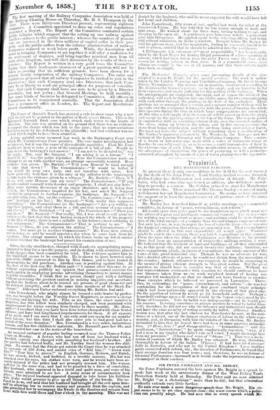TILE MANCHESTER. ELECTION.
At present there is only one candidate in the field for the scat vacated by the death of Sir John Potter. Lord Stanley invited to conic forward, declined after due deliberation and consultation of friends. Mr. Fair- bairn, who had some time ago issued an address, also withdrew unwil- ling to provoke a contest. Mr. Cobden refused to start for Manchester or anywhere else. There remained Mr. Thomas Bazley—a man of mark, well-known beyond Manchester boundaries. He seems to have received the support or at least the acquiescence of all parties—even of the rump of the League.
Mr. Barley has described himself at public meetings as a commercial candidate in favour of "peace, retrenchment, and reform." All would agree that peace must be the foundation upon which must rest the affairs of a great and intelligent commercial country. For such a coun-
try nothing was so important as peace—and nothing could be more destruc- tive of the vital energies of a country than the unfortunate existence of war. Not only had we, in war, to regret the loss of valuable lives—there was also the financial exhaustion that always aceompanied war. That retrenchment should be effected in this vast expenditure all would agree. Whatever might he said to the contrary, there was lavish expenditure in this country. From the time when the Duke of Wellington was Minister to the present there had been an augmentation of twenty-five millions sterling a year. He! elieved that the freehold of land and buildings, of all that surrounded us, in this great :city, did not exceed twenty-five millions; therefore, we were squandering yearly, in excess of expenditure, the whole amount of the rake of this great industrial city. Though he was no advocate for war, buts decided advocate of peace, he would not shrink from the necessities of theeeountry.; indeed, whenever it was required, he would be unsparing in the means of giving efficient strength .10 this great nation. But the great question we should have to consider was that of reform. Without we ha& representation coextensive with taxation we should continue to have our finances taken from as—to work :weighted instead of having our energies left unshackled—so that we should not have freedom to exercise those energies which he believed we possessed in Lancashire. There- fore, in contending for "peace, retrenclemeut, and reform "—he was but contending 'for the recognition of that great combined triple principle which had been universally approved by the electors of that great city. On the questionef reform be would go fir household suffrage. Perhaps a household suffrage upon a 51. rental would be the lowest entertained by the House of Commons. Vote by ballot was iudispensuble—and he would give his .reasons. In voting sometimes in private matters he voted by ballot him- self; therefore, he did not see why the labourer and industrious man should not are the same security of vetting secretly by 'ballot. (Cheers.) Another reason was, that after the last election for Manchester lie met, at the reel- dence .et a friend, one of the largest employers of labour in the whole com- munity, and, in discussing with him the results of the election, Mr. Bazley intimated to him that he feared there had been in some quarters intimida- tion. ("Hear, hear !" and disapprobation.) "intimidation !" said the gentleman, "Intimidation 1" he again emphatically repeated, " why, if I had a man in my employ who didn't vote as I voted, I would discharge him from my premises." (Chore and cries of "Shame ! ") That was a decla ration of coercion of which Mr. Baxley was ashamed. He was, therefore, thoroughly in favour of the ballot. (Cheers.) It bad been tried success- fully in Australia, and why not in the United Kingdom I L pen another point connected with reform, viz., the duration of Parliaments, he found that their average duration was four years ; and, therefore, he was in favour of triennial Parliaments—inasmuch as it would make the representatives wore circumspect in their conduct.


































 Previous page
Previous page